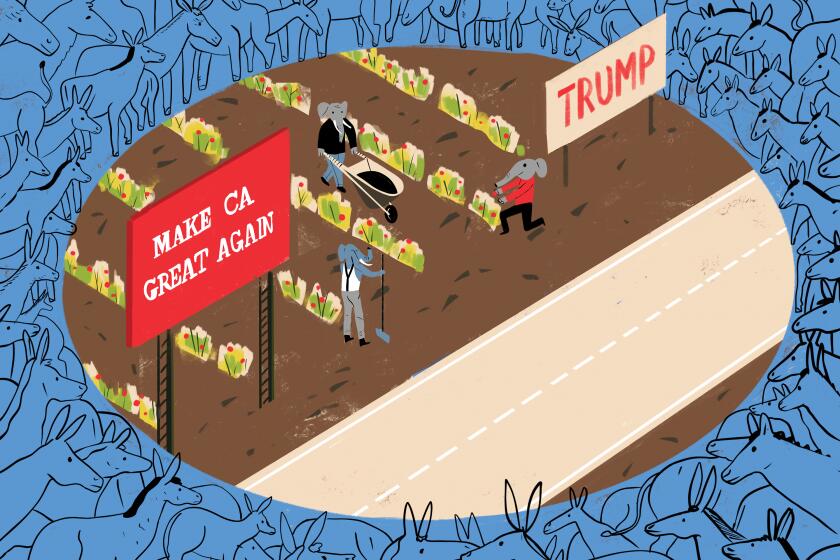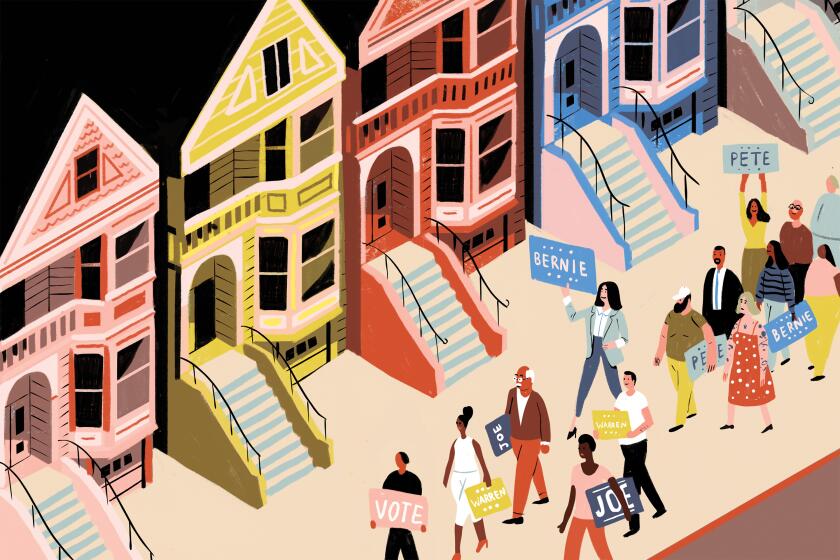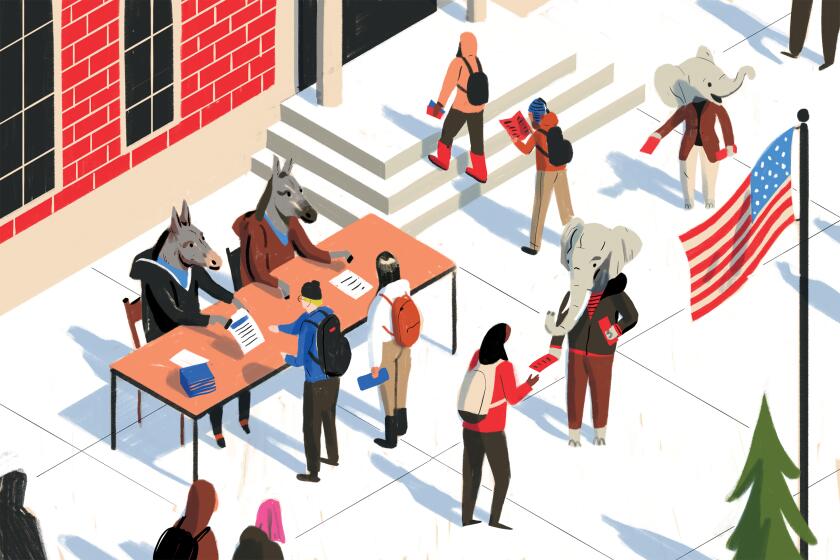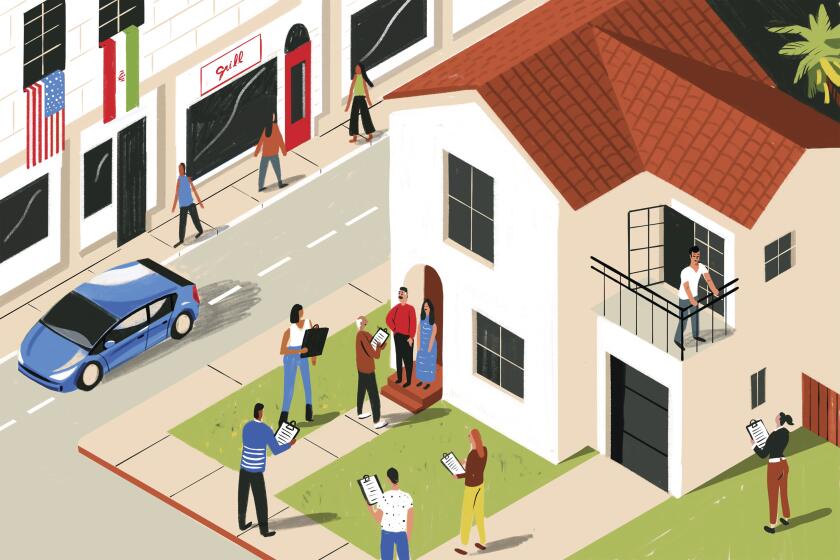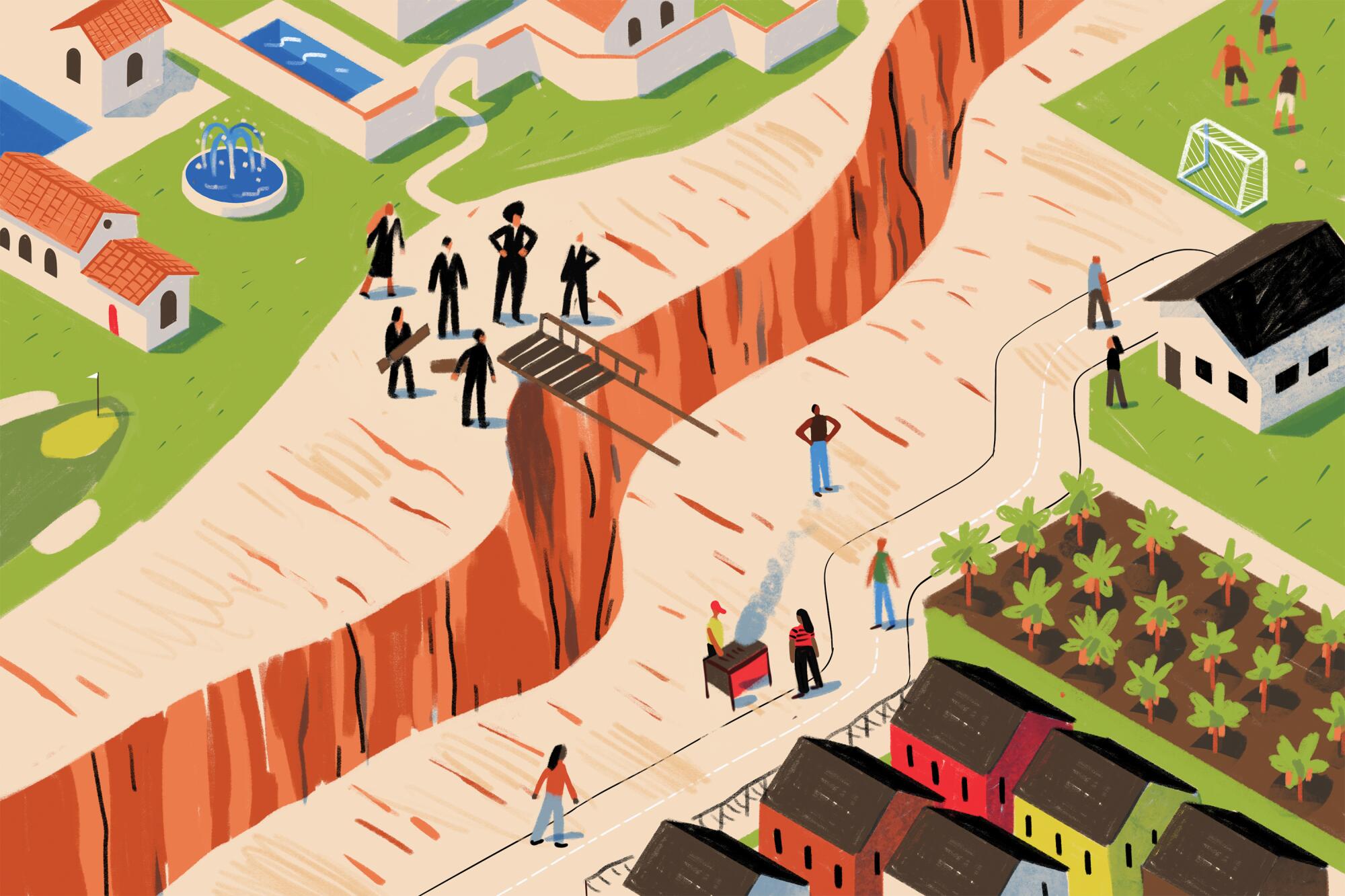
COACHELLA, Calif. — There they were on a warm Saturday morning, the ruling political class of the eastern Coachella Valley.
Kicking it in the park. With pan dulce and bacon-wrapped hot dogs.
Just like the old days. Enjoying their time together, but planning for the future.
The party this time: a get-out-the-vote effort at Miles Park in Indio for Elizabeth Romero, a Riverside County Board of Education trustee who’s running to represent the open 28th state Senate district, which stretches from Murietta to Blythe.
It’s the last office that this group of friends — children of Mexican immigrants who grew up in Coachella, went off to college, then returned — needs to cement the transformation of their hometown.
Latinos have been a strong influence in Coachella politics since the mid-1960s, when a majority of the City Council was of Mexican American descent, among the first cities in California to reach that milestone. But Coachella largely stagnated amid neglect from its regional, state and federal representatives, who were almost always white and Republican.
When out-of-town politicos showed up in the Coachella Valley, they’d invariably stick to the western side, in wealthier cities such as Palm Springs and Rancho Mirage.
But the days of the self-proclaimed “City of Eternal Sunshine” as an afterthought are over.
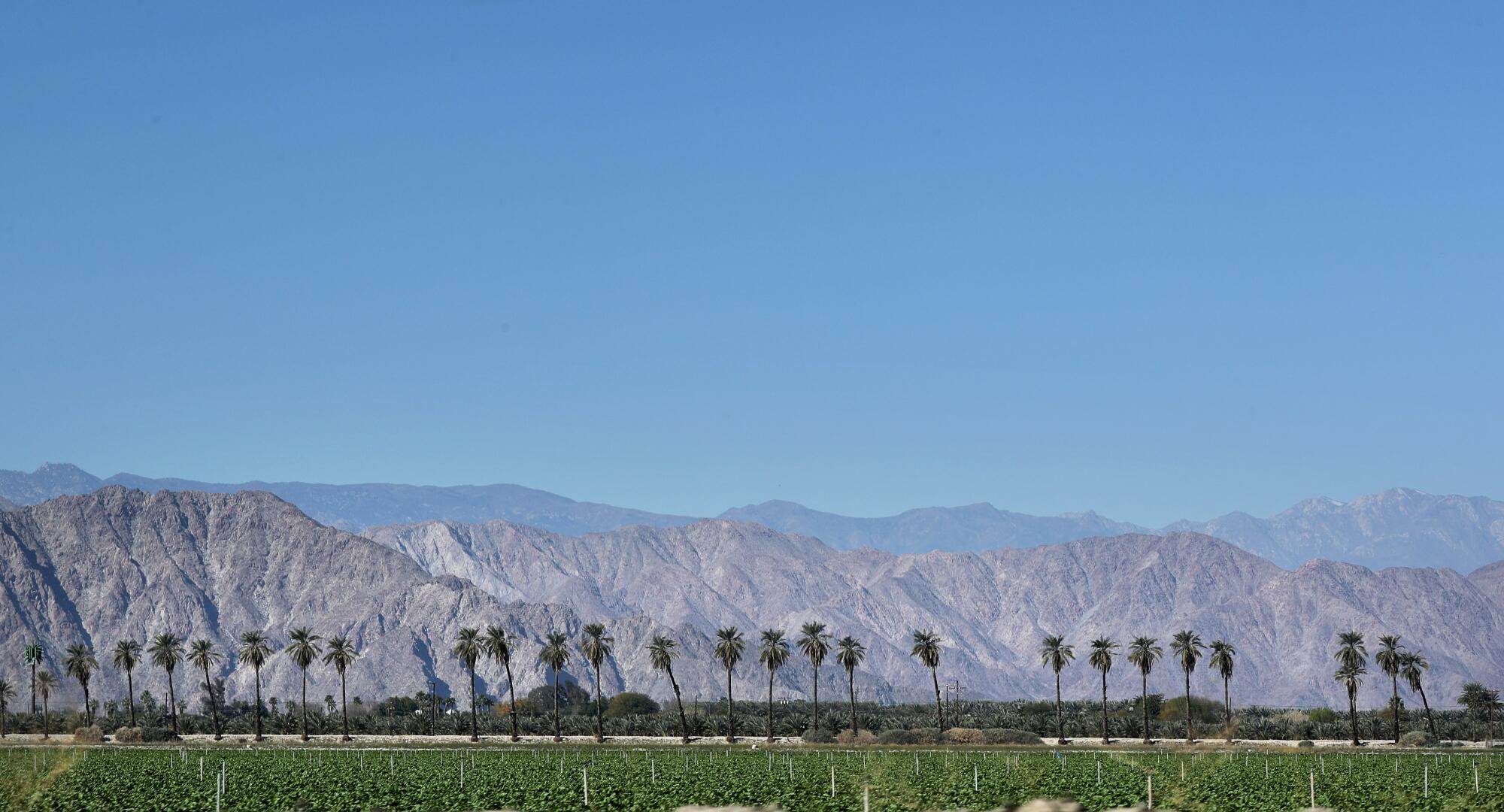
Presidential candidates have sought and won the endorsements of Coachella-raised raza. Riverside County Supervisor V. Manuel Perez is going with Michael R. Bloomberg. Assemblyman Eduardo Garcia (D-Coachella) has cut statewide commercials for Tom Steyer. Romero is undecided.
The Bernie Sanders campaign opened a field office in downtown. Coachella’s council members hosted him at a raucous rally in December to unanimously endorse the Vermont senator — the only city council in the country to publicly do so.
The diversity of endorsements hasn’t caused stark fissures here, although 36-year-old Mayor Steven Hernandez, who also is chief of staff for Perez, jokes that the “Xers” (as in Generation X) in town are too scared to publicly support Sanders.
“But the fact there is connections to other campaigns speaks to the gains we have accomplished as a community,” he said. “That means there’s somebody in the camp that’s talking to them, and we’ll coalesce after the primary.”
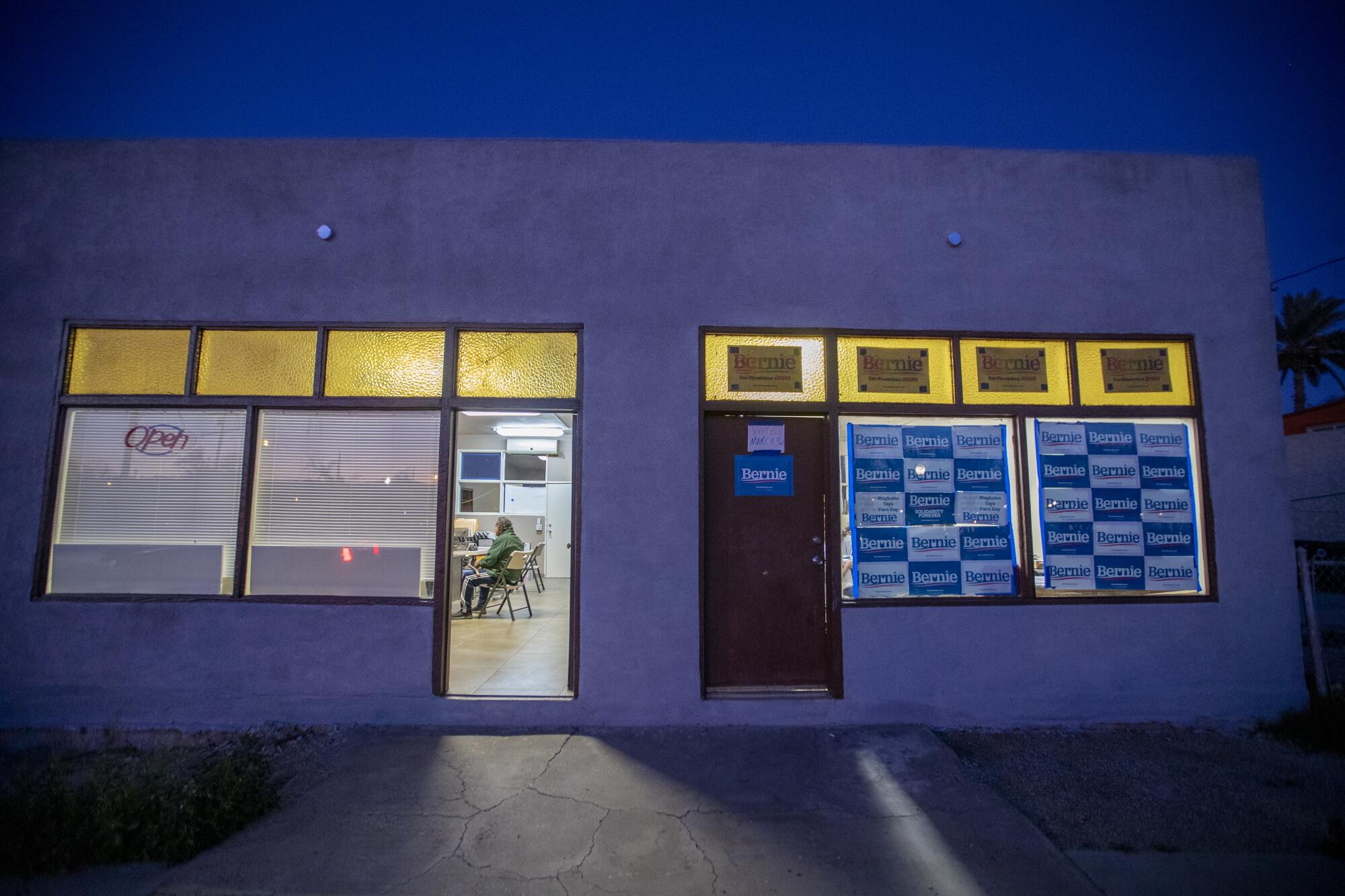
Coachellanos now fill the positions of mayor, county supervisor, assembly member and congressman. A new generation is winning seats on school boards and water districts, and joining city commissions. All have the same mission: build a city with amenities and opportunities that didn’t exist when they were kids.
This Coachella has emerged over the last 15 years, a time when the city’s fame exploded due to its namesake music festival (actually held in Indio) even as its population has remained overwhelmingly immigrant and working class. In an era when Latinos make up a plurality of California’s population, but still lag in political representation, power brokers local and national are noticing what’s happening here.
The Coachella politicians “understand the sacrifices of growing up in the farm-working world,” said Luz Gallegos, community programs director for TODEC Legal Center, which runs citizenship workshops across Riverside County. “That’s why están super-prendidos. [They’re super-motivated].”
They’re “not only making people pay attention to their community, but also make us ask questions about who’s on the inside and who’s on the outside,” said Assembly Speaker Anthony Rendon (D-Lakewood). “Not only do we want to know what Coachella thinks, but now we also ask what San Bernardino, Bakersfield, Fresno and Merced think.”
But if a revolution now runs this city of date palms and weathered shopping centers, it’s one that’s a work in progress.
Garcia, a former Coachella council member and mayor who replaced Perez as the eastern Coachella Valley’s assembly member in 2014, points to a revitalized downtown, a new library and community murals that rival anything in Los Angeles.
“Have things gotten better? They have,” the 43-year-old said. “Is there work to be done? Without a doubt.”
There are few indicators here that a presidential primary is happening next week in California. Instead, nearly all the lawn and street signs around the eastern Coachella Valley plug Romero, with only a handful for her main opponents, Assemblywoman Melissa Melendez (R-Lake Elsinore) and Palm Springs resident Joy Silver, a Democrat.
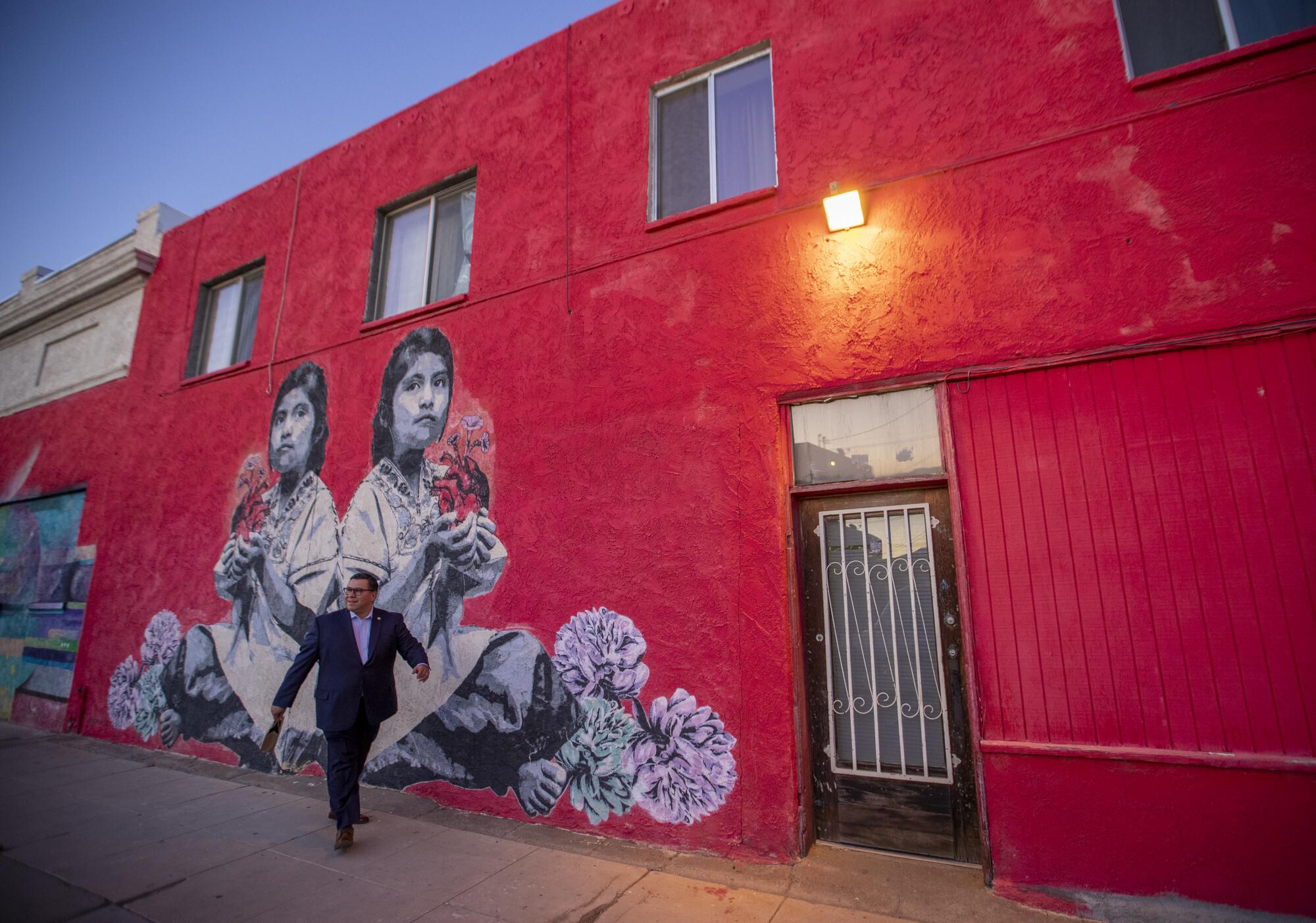
Billboards supporting Romero loom over both directions of old California 86, which connects Indio to Coachella and ends in Mexicali, Mexico, where Garcia’s family is from. Cruising down Indio Boulevard onto Highway 111, past bustling restaurants and boarded-up businesses, he makes note of what he says is proof of the area’s change in fortunes — parks.
Miles Park in Indio. Bagdouma Park in Coachella.
Then Garcia stopped at Rancho Las Flores Park, which opened in 2012 with the help of a $5-million state grant. Its three soccer fields and every possible swath of grass were swarming with youngsters channeling their inner Chicharito. Paleteros hawked Mexican popsicles.
“This was a dirt lot,” Garcia said. “This was going to be all houses. But that’s not what the community wanted.”
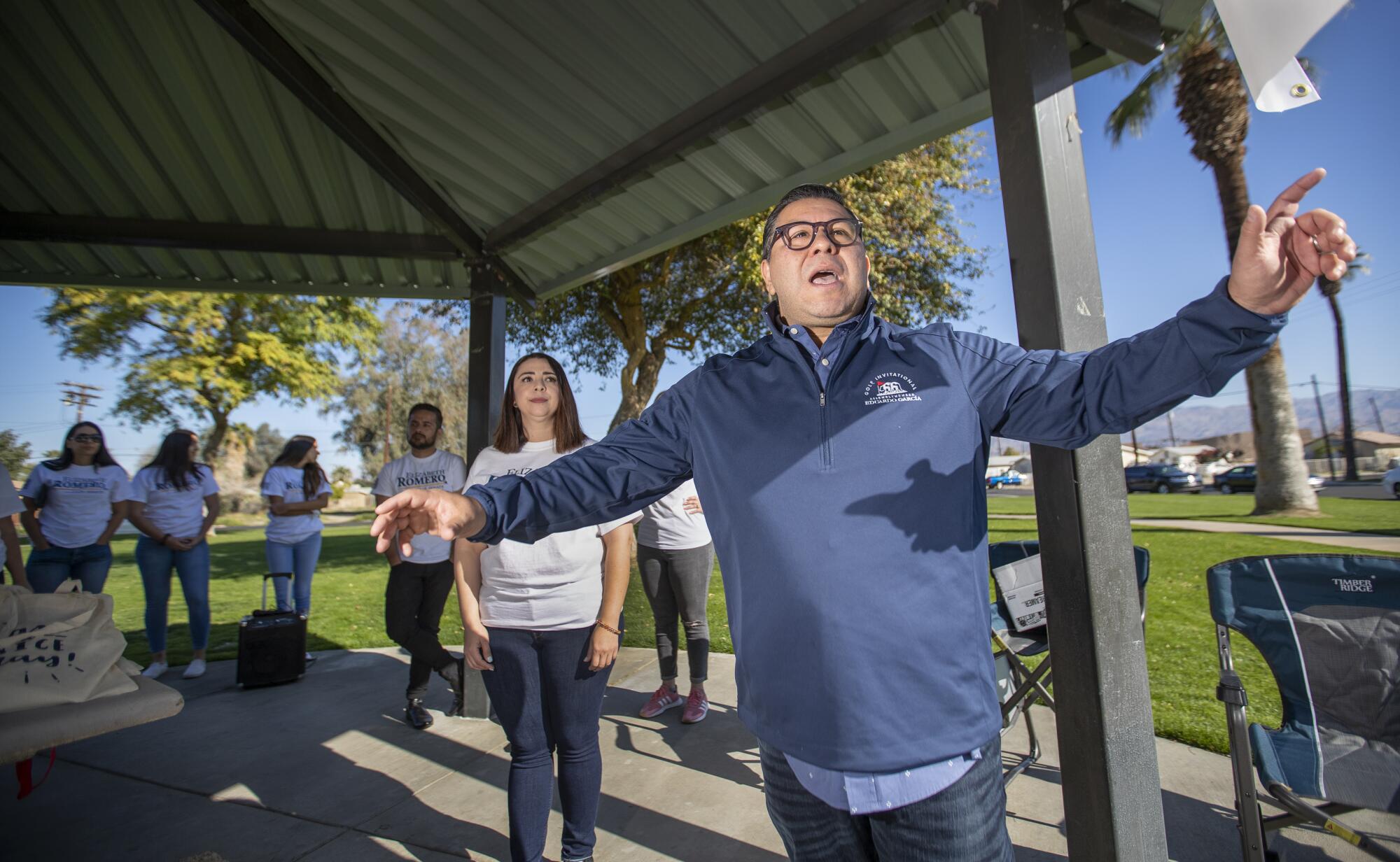
In his time in Sacramento, Garcia wrote a bill that allows home cooks to legally sell their food and co-authored a $4-billion parks bond passed by California voters in 2018. Both, he said, were inspired by the informal economy and lack of parks he and too many others grew up with.
Garcia and his political peers all tell the same origin story: They were the students at Coachella Valley High School in Thermal who left for college in the big city.
Coachella Valley Unified trustee Maria Machuca went to San Bernardino. Perez and Garcia to Riverside. Rep. Raul Ruiz (D-Palm Desert), UCLA.
That’s when everyone realized they grew up on the wrong side of the proverbial tracks.
“We knew things were going on, things here that weren’t right, but couldn’t put it together,” said Machuca, who still lives in the unincorporated community of Mecca.
“You’d come back and drive 20 minutes down the road, and you’re in Indian Wells,” Ruiz said. “You’d ask yourself, ‘Why the disparities?’”
The former classmates formed a group that held spoken-word nights and community workshops, where residents told them they felt they had no voice on the council. They then began to run for school boards and council seats before scoring a series of prominent upsets — Perez beat a former Palm Springs police chief for an Assembly seat in 2008, while first-time candidate Ruiz won the congressional office held by longtime incumbent Mary Bono Mack in 2012.
The old guard is still adapting to this new reality: Not a single member of the board of directors for Democrats of the Desert, the official club in the Coachella Valley, is Latino or was born in the region. But as they’ve assumed power, the Coachella class has learned to work with opponents.
Perez cites his close relationship with Brian Nestande, a fixture in Southern California GOP circles and a former assembly member who is Riverside County’s deputy chief executive. “It’s easier to get what you want when you talk to people in good faith,” Perez said.
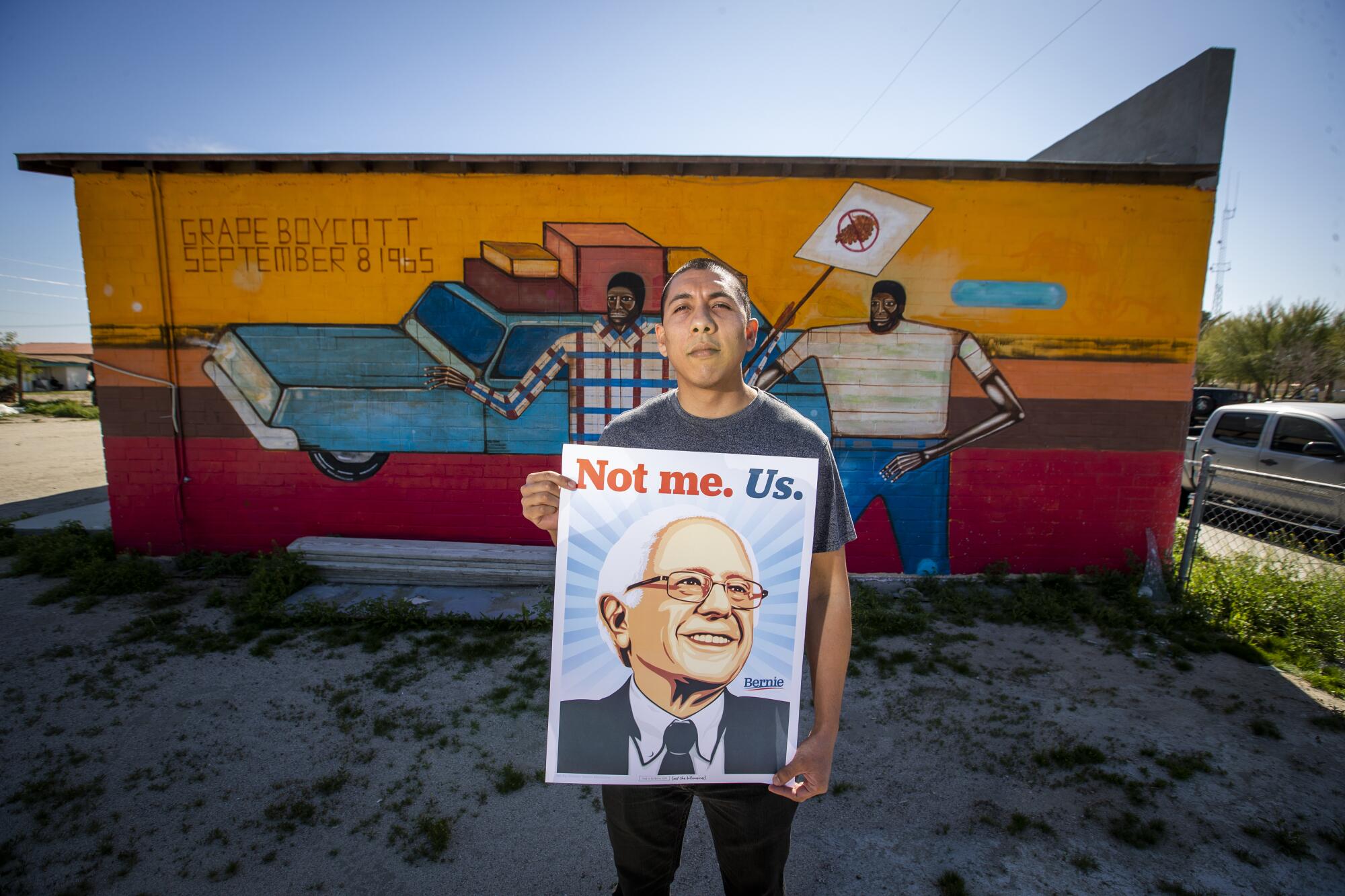
Lupe Ramos Amith, 56, has served on the Indio City Council since 2004 and cracks: “I’m old enough to be the aunt” of Coachella’s politicians. A supporter of President Trump, she left the Republican Party last year and is now unaffiliated.
Yet she has worked with Garcia, Perez and others to bring opportunities to the East Valley: a satellite campus of the College of the Desert in Indio, the expansion of the Desert Healthcare District — which governs public hospitals and clinics in the region — beyond the West Valley. Her bipartisanship has drawn the ire of local GOP politicians.
She says those critics don’t get it.
“We can stand up regardless of our political differences, because we grew up here,” Ramos Amith said. “We get what our hometowns need, and we all work in our own way toward it.”
For millennial politicians such as Indio Councilman Oscar Ortiz, his older colleagues have set an example to build upon.
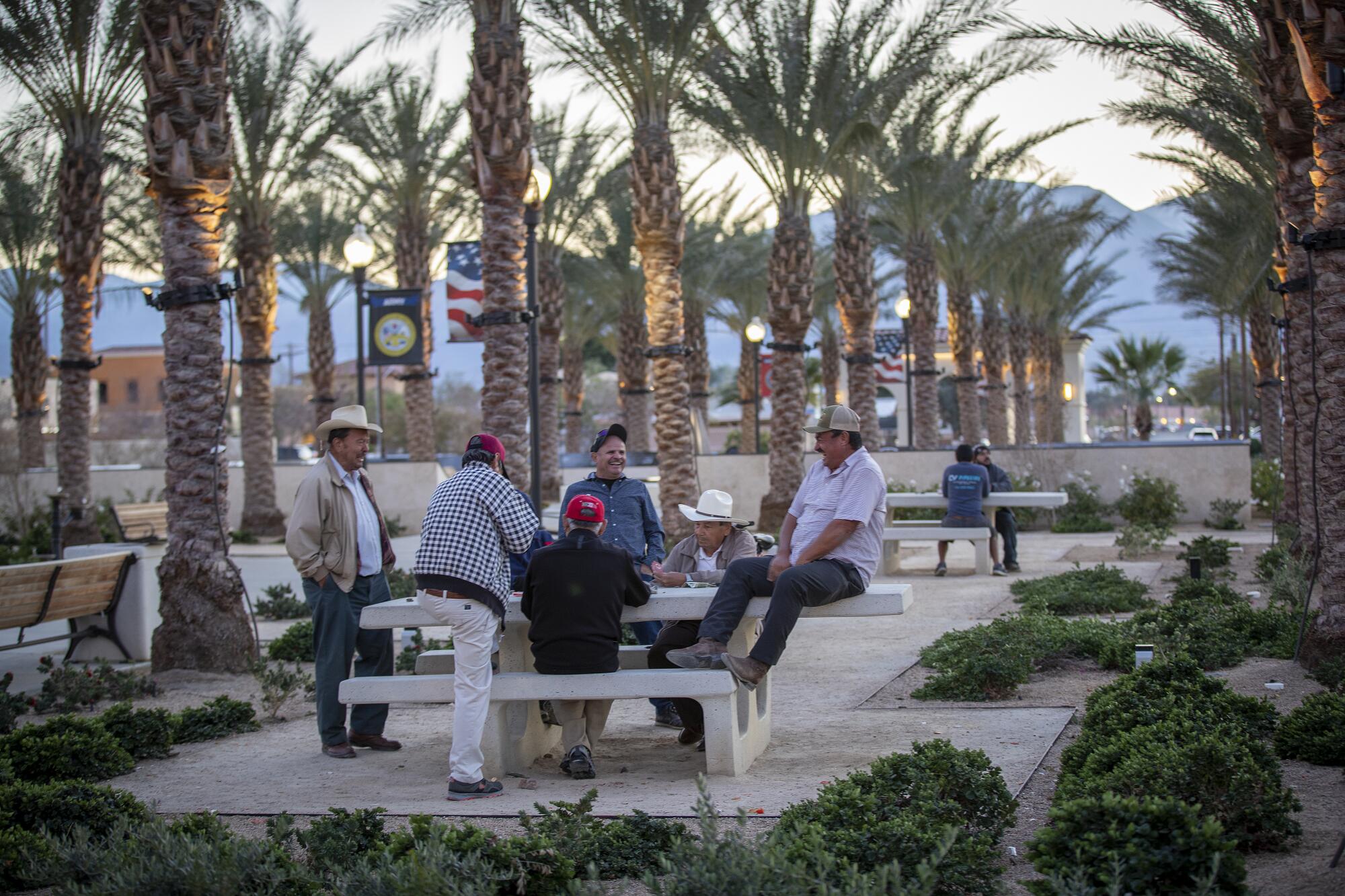
The 31-year-old heads Sanders’ campaign office for the region. Born in Mexicali and raised by a farmworker father and a mother who cleans houses, he graduated from Stanford University with a degree in chemistry before running for City Council in 2018.
“We have the privilege of seeing these movements before us,” he said outside the Sanders headquarters, housed at Casa del Trabajador, a historic building in downtown Coachella where Cesar Chavez once organized agricultural workers.
“They opened up the gateway.”
At a December rally in front of the Casa del Trabajador, Mayor Hernandez introduced Sanders to the crowd.
“Tio Bernie, as we refer to him in Coachella, knows that it’s time to create a new chapter in America.”
A more equitable chapter.
“I tell a lot of my friends: You see those private planes flying over us?” Hernandez said. “If those well-to-do individuals want to call the Coachella Valley home, we can’t be eager to run out of here. So why can’t we work toward making it for us instead of them?”
More to Read
Sign up for Essential California
The most important California stories and recommendations in your inbox every morning.
You may occasionally receive promotional content from the Los Angeles Times.
